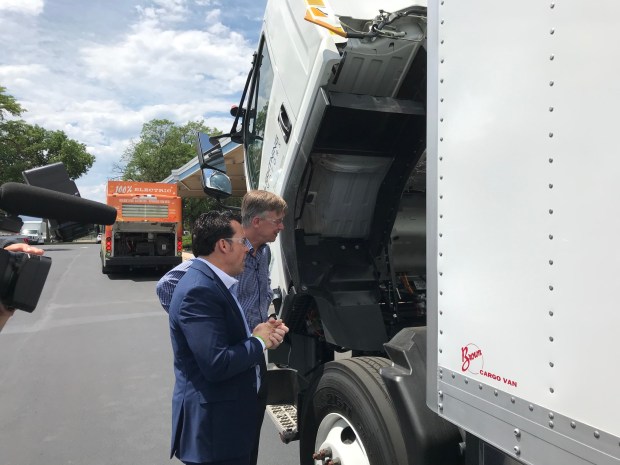LOVELAND — Speaking from one of the historic homes of high-tech innovation in Colorado, Sen. John Hickenlooper, D-Colorado, waxed on about the impact of innovation on changing the culture of the nation.
Hickenlooper visited Loveland Thursday and specifically Lightning eMotors Inc. (NYSE: ZEV), which is located on the Forge campus, the former Hewlett-Packard facility in Loveland — HP’s first location outside of California.
“If you were going to look at who are some of the great innovators, [you see here] one of the greatest innovators ever [Hewlett-Packard] and now one of the new great innovators [Lightning.] It does make you feel that karma is still at play,” he said.
Lightning CEO Tim Reeser gave Hickenlooper and a gaggle of reporters, city, county and industry officials a tour of Lightning, an e-vehicle manufacturer that recently went public on the New York Stock Exchange.

Hickenlooper, a geologist by training, appeared to be fully engaged in the details as Reeser explained how traditional gasoline-powered vehicles are converted to electric drive drains. No detail seemed too small, from Hickenlooper’s questions about the color coding used to define high-voltage wiring to how steel parts are fabricated in-house instead of farmed out to a third-party vendor. The senator even created a part in the welding and fabrication lab.
“It’s not a surprise that the largest producer of e-vehicles is in Colorado. We were just talking about how prices of batteries have come down 50% in a year,” he said. He seemed to be impressed — because he mentioned it multiple times — when Reeser told him that a traditional gas-powered vehicle might get 13 miles per gallon, and when converted it gets the equivalent of 66 mpg, five times more efficient.
He drove one of Lightning’s converted delivery trucks and rode in an electric-powered shuttle bus; he remarked on the acceleration and performance.
“Lightning very wisely has created a niche for itself. Ford is going to make the pickup trucks but not the big trucks,” he said.
Reeser, noting that the company was in Building A at the Forge complex and is now retrofitting Building B for its use as well, said that the company this year will produce 500 vehicles and has orders for 3,000 vehicles next year. It’s the largest commercial zero-emission fleet manufacturing facility in the U.S. and expects to produce more than 20,000 vehicles by 2025, according to literature distributed at the event.
“We in the Senate, we’re agnostic. We don’t favor one company over another. We don’t even favor our own state. [When] we allocate these expenditures, it has to be what’s the best for the greatest number of people; it’s got to be the highest quality at the lowest cost.”
He seemed pleased with the part that electric delivery vehicles will play in combating climate change.
“We’re not always dealing with doom and gloom about climate. This is good news. … Not only are we getting something more efficient, but prices are coming down; they’re dropping like a stone. At the same time, we’re addressing climate change.”
Fleets are a way “to accelerate the transition to a new world where everything is electric. We have to recognize that climate change is real. We need to go right away into fleets,” he said, which helps to make consumers more familiar with the technology when they see it all around them.
“To have a place like this that can deliver those electric vehicles at a competitive cost that are less costly to run, we’re in the process right now of changing our culture.”
© 2021 BizWest Media LLC
